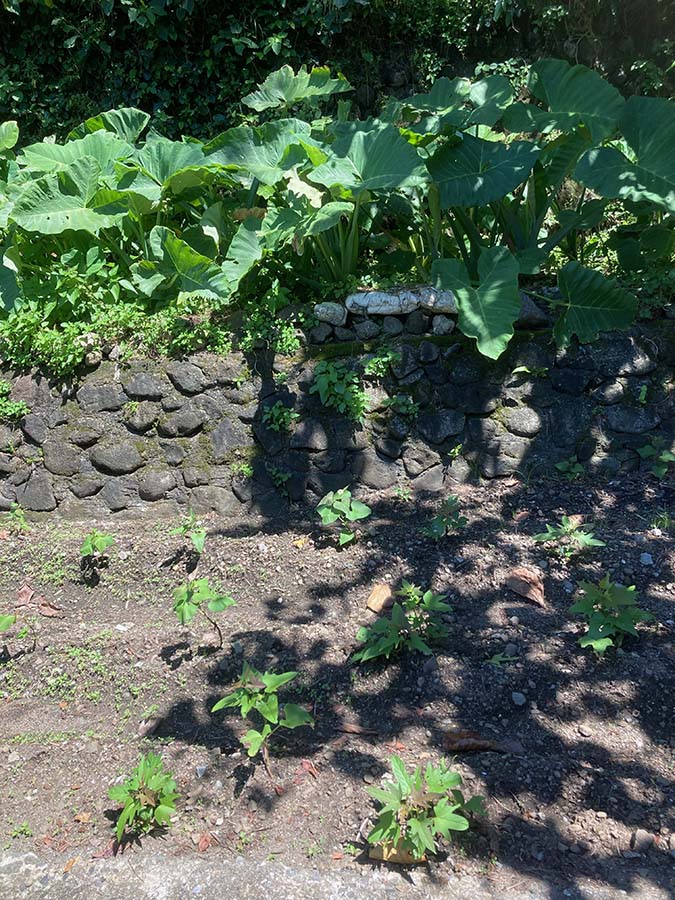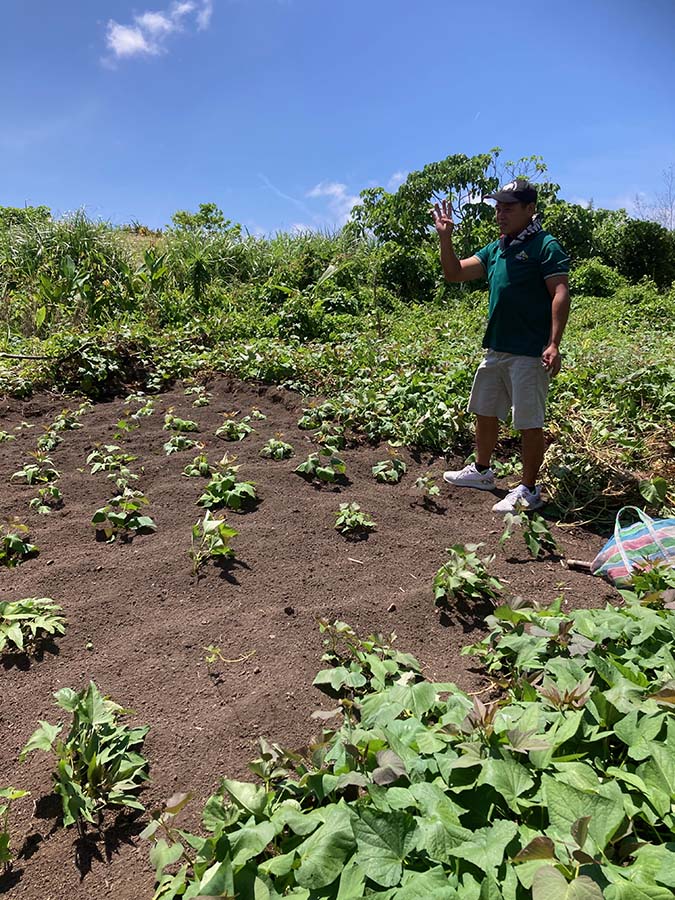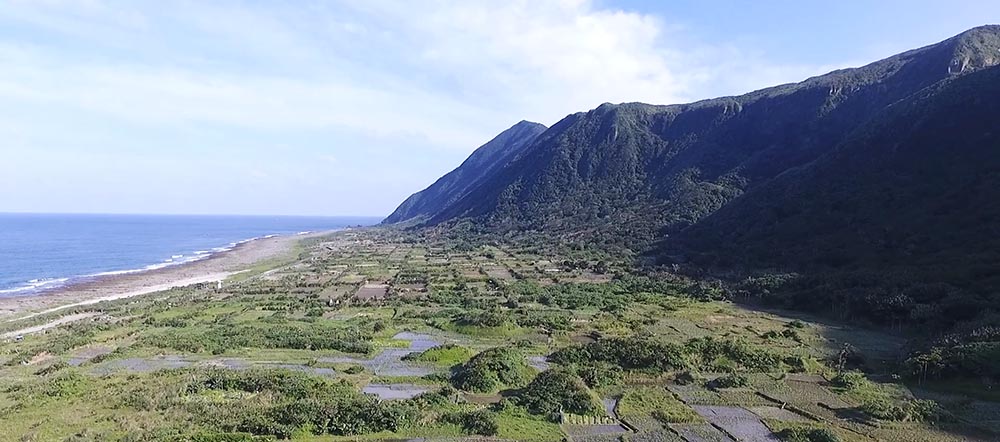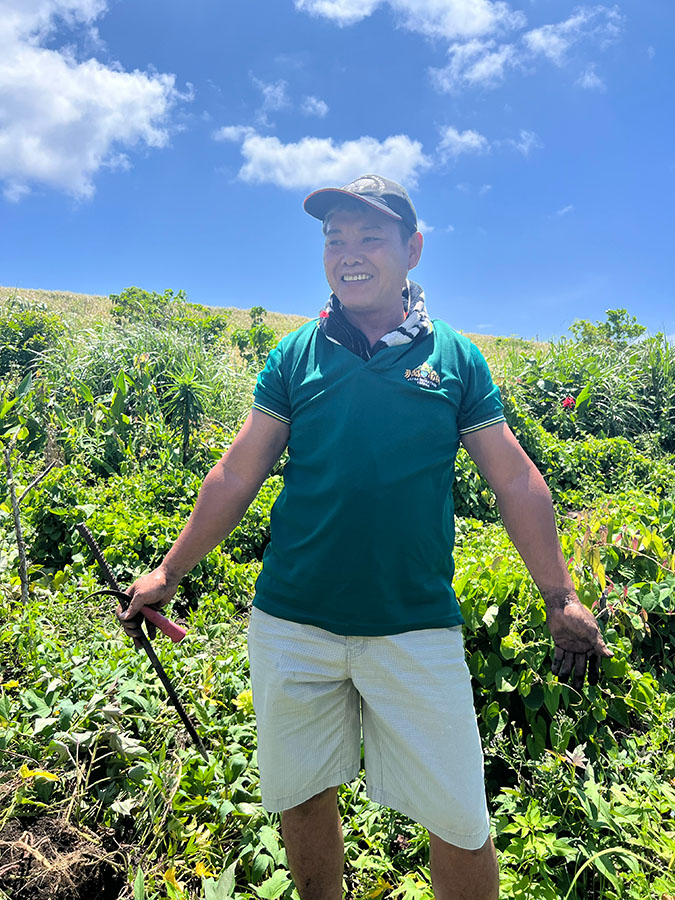Planting Hope and Planting Love
The Taiwanese inherited Japanese colonial schools on Pongso no Tau, expanded them, and made them effective instruments for the assimilation of the Yami into Taiwanese culture and society. The school system largely ignored Yami food culture. In both curriculum and in practice, schooling generated radical change in the food habits of the Yami. By that same power, schools can be crucial places for re-awakening food memory, which lies at the heart of learning to be Yami.
Plant Hope, Plant Love
The first day of school,
a day connecting children
and earth.
We use our hands together,
in our soil,
to plant seeds of hope.
Let the soil brim with hope.
Hope, rooted in the soil,
needs the care of love.
In this way, the hope of children
may be realised.
I wrote this poem after leading the teachers and students of Lanyu Elementary School to plant sweet potatoes on the first day of school in August 2019. Why should we lead teachers and students to plant sweet potatoes? The original idea was to give an orientation for teachers and students about sweet potatoes and taro, the traditional staple foods of the Yami. The reason I chose to plant only sweet potatoes in the school garden is that the soil is suitable for sweet potatoes, but not for taro. In addition, sweet potatoes need a mere four months to grow and can be harvested just after the school term ends, whereas taro roots need at least ten months or a year to grow before they can be harvested.

Fig. 2: The school garden with
recently planted sweet potatoes.
Four months later, teachers and students could harvest sweet potatoes together at the end of the semester, so the students could take them home to eat with their families. I harbour a great hope that, through education, the Yami people may regain the food autonomy they lost in recent decades. How did the Yami lose their food autonomy? The schooling system of the Republic of China (Taiwan) has played a crucial role in this.
After World War II, when the Republic of China took over Taiwan, it continued the education system initiated during the Japanese occupation. In order to promote standardised national education to the general public, it carried out an assimilation policy and established public elementary schools in Indigenous villages across Taiwan, including four schools on Orchid Island. My parents attended public schools on Orchid Island during the 1950s. School lunches were often sweet potato and taro brought from home by the students. Occasionally, the school kitchen served steamed buns made of imported wheat flour. But at that time, the staple food of Yami families was still taro and sweet potatoes.

Fig. 3: Syamen Womzas in his potato field in Imourud.
The government set up a police headquarters and jail on Orchid Island in 1952 to detain Taiwanese prisoners (discontinued in 1979), and in 1958 the Veterans Affairs Council established farms (discontinued in 1991). These two institutions occupied much of the Yami land. As a result, the islanders were unable to grow enough staple food to support their families and came to rely on charity food from churches – wheat, flour, and a little rice – to supplement the lack of taro and sweet potato.
When I entered first grade in public elementary school in 1975, school lunches were regularly provided. School lunches were mainly steamed buns, with ferns gathered by the students themselves. The staple food of the Yami people's homes was still taro and sweet potatoes. Rice was the “snack” at home. Only when my father went to work in Taiwan could he buy a bag of rice and carry it home. After sharing with relatives and friends, only half a bag was left to eat at home. With many family members, the rice was usually eaten up within a few days.

Fig. 4: The farmland of Ivarino
(occupied by veteran farms,
1958-1991).
I started junior high school in 1981. Back then, the school provided accommodation and three meals a day. There was only one junior high school on the island, and students came from all six villages. Due to inconvenient transportation, most students had to stay overnight at school during the weekdays. Rice and steamed buns were provided for all three meals. Taro and sweet potatoes were only eaten when I went home on weekends or holidays. My eating habits changed radically, from primarily traditional Yami food to primarily Han/Taiwanese food.
Until 1989, when I started teaching in the public elementary school system, school lunches consisted mostly of rice, plus one dish of vegetable or meat and a cup of soup. My parents and brothers had some income at that time, so they could buy bags of rice from Taiwan. Rice gradually became the staple food for all three daily meals at home, as it did for other families on the island. The traditional staple foods of the Yami people, taro and sweet potato, had become a minor part of our daily diet. Today, taro and sweet potato only appear on the dining table during more important festivals, such as the Flying Fish Festival, the Beautiful Month Festival, 1 other spiritual rituals, and various inauguration ceremonies.

Fig. 5: Syamen Womzas
in his sweet potato field.
The key driving force behind such a major shift in eating habits is public schools: not only the meals, but also the education. For over 75 years, teaching was held in Mandarin Chinese, and the books and curriculum were the same as in Taiwan. Over time, this caused assimilation into Taiwanese culture and sowed seeds of alienation from the Indigenous Yami culture. For me, teaching local knowledge is important to counter assimilation and strengthen Yami culture. There is a lack of schoolbooks with Yami perspectives and knowledge. With this in mind, my mission is to create schoolbooks that include Yami cultural elements and knowledge in each and every subject. These will complement the main textbooks. Our children grow up in two worlds: Taiwanese and Yami. As a teacher, I seek to instill in the pupils the roots of Yami culture: self-confidence, respect, gratitude, and sharing. I also seek to educate the children about the importance of food.
It is a shame that the traditional staple foods of taro and sweet potato, which are local, seasonal, and have the shortest food mileage and carbon footprint, have not been prioritised in the school system. Therefore, I want to awaken food memories of the Yami people through various activities in the school, so that the Yami can become at least partially self-sufficient in their food provisioning and eating habits, instead of being entirely dependent on imported food.
When the food memory of the Yami returns, the abandoned land on Pongso no Tau can find vitality and life again, and this is what I desire and wish for in my heart.
Syamen Womzas lives in Yayo. At age 15, he left to study at Taitung Normal College. He returned at age 20 to serve as a teacher and principal of a school on Lanyu. He is dedicated to developing Yami Indigenous education. He is currently Yami representative in the Indigenous People Transitional Justice Commission under the R.O.C. Presidential Office. He advocates the rights and interests of the Yami, especially the removal of nuclear waste from Pongso no Tau, practicing social justice, and leaving a clean and beautiful island to future generations. Email: syamen.womzas@gmail.com